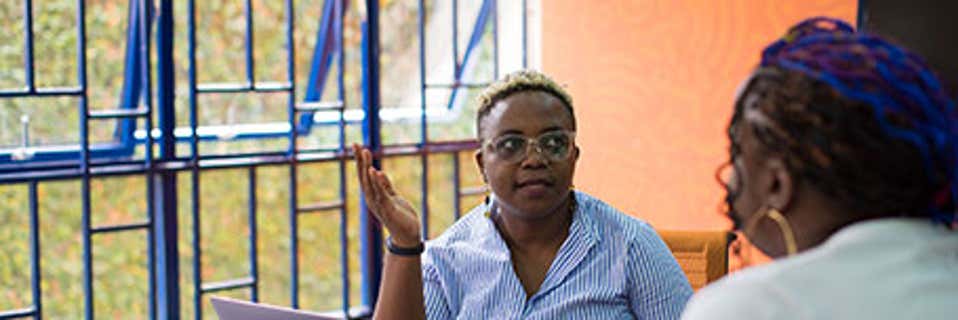Using PRINCE2 in non-profits

- Blog
- Budgets
- Communication
- Project management
- Project planning
- Project progress
- PRINCE2
June 9, 2020 |
3 min read
- Blog
- Budgets
- Communication
- Project management
- Project planning
- Project progress
- PRINCE2
We spoke with Michelle Oluoch, who works at LVCT Health in Kenya. Her organization promotes HIV prevention, testing, care, and treatment and fights against sexual and gender-based violence.
What is your professional background?
I have undergraduate and postgraduate degrees in law and my first job was in a law firm, but I’ve always been interested in human rights. That was what I wanted to do, so when I got the opportunity to move to LVCT Health, I jumped at it.

How did you get into project work?
A grant came in last year for a project called ‘INSPIRE: Seven Strategies to End Violence against Children’; I worked on that as a project coordinator. Soon after, I was juggling four projects. I was working under someone with experience, but I wanted to pursue a formal course that would help me to support myself on future projects.
Why PRINCE2?
Kenyan employers want project managers with either a PMP or PRINCE2 certification. I didn’t know the difference at first, and I think a lot of the employers don’t know the difference either!
I did a lot of research and, in the end, chose PRINCE2 because it’s adaptable. I was also thinking of the future: if I were to get another job, where would it be? With my qualifications, I will probably always work in countries where PRINCE2 is more recognized.
What are some of the key challenges for projects in your organization?
We have tight budgets. Any money we have needs to be used for our project goals, but there’s no one way of doing things. We know the end goal, but not always how to get there. Also, donor expectations are really varied: some are really strict, others will let you do what you want. There’s usually some friction and we need to communicate a lot when we are trying to decide on an approach.
I want to use my PRINCE2 knowledge to help organize our projects better and more consistently, so we get better outcomes for anyone who needs help.
Do you want to continue managing projects?
Yes, of course! I want to grow, which is why I took PRINCE2. In Kenya, papers and certifications are really important, so PRINCE2 is a step towards my goals.
I also think that PRINCE2 is not just for project managers. It’s very important for anyone involved in projects to make changes and understand how change works. Project management knowledge will always be useful.
How was the classroom training?
It was interesting. I got the book the week before and thought ‘What did you get yourself into?’ because it is so heavy. It reminded me of my law books! In the first two days of the course, there was so much to take in. It got clearer on day three because our trainer kept repeating the information. Then we did practice questions and it became even easier.
I spent too long looking in the book during the Practitioner exam, but thankfully I passed despite being really nervous. I think it’s good that it was challenging, otherwise there would be no benefits.
Was there anything about the material in the course that surprised you?
No real surprises, but there was a lot of new information. Overall, the course made everything I already knew more coherent. Sometimes if you know a little bit of one thing and a bit more of another, you don’t understand how they are related. PRINCE2 helped me to fill in the gaps.
It was also really good to be able to talk about my own organization and projects. That was one of the key benefits for me: I could relate PRINCE2 to what I’ve done before and what really happens in my organization.
Would you recommend the course?
I already have! I have friends in many different industries, and I told them that PRINCE2 is something they should consider to make them stand out.